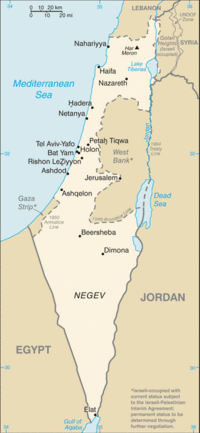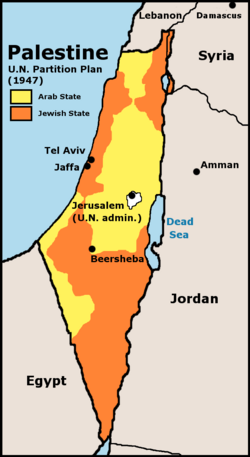Israel-Palestine Conflict: Difference between revisions
imported>Steven Clark Bennett |
imported>Steven Clark Bennett |
||
| Line 41: | Line 41: | ||
At first, the Arab armies did well, with Egypt advancing into the Sinai and Syria retaking parts of the Golan Heights. Then, the war swung back in Israel's favor. By the second week, the Golan Heights had been retaken. On October 15th, an Israeli force under General [[Ariel Sharon]] pushed through a week point in Egyptian lines and crossed the Suez canal. On October 26th, the parties agreed to a UN-brokered cease-fire. | At first, the Arab armies did well, with Egypt advancing into the Sinai and Syria retaking parts of the Golan Heights. Then, the war swung back in Israel's favor. By the second week, the Golan Heights had been retaken. On October 15th, an Israeli force under General [[Ariel Sharon]] pushed through a week point in Egyptian lines and crossed the Suez canal. On October 26th, the parties agreed to a UN-brokered cease-fire. | ||
== | ==The Oslo Accords== | ||
==The Al-Aqsa Intifada and the Palestinian Civil War== | |||
==The Search for Peace== | |||
Revision as of 20:46, 17 April 2008
The Arab-Israeli conflict, sometimes called the Israeli-Palestinian Conflict, is an interment and ongoing series of clashes between the Jewish nation of Israel and the Arab Palestinians, allied with some of the surrounding Arab countries. The conflict has, in some form or another, lasted the whole of the 20th century, and a solution still remains elusive.
Beginnings
The conflict's origins trace back to the late 19th century. In response to the ongoing anti-Semitism in Europe, Jews such as Theodore Herzl began to advocate the return of Jews to their ancient homeland of Israel, known to its Arab inhabitants and most of the world as Palestine. This idea soon became known as Zionism. Zionism gained a following among some Jews, and in 1897 the first Zionist conference was held in Basel, Switzerland. Inspired by Zionist ideas, several tens of thousands of Jews had immigrated to Palestine by the start of World War I.
At the end of that War, the Muslim Ottoman Empire, which had been in control of Palestine, and indeed much of the Middle East, was dissolved. Palestine became a mandated territory of Great Britain. During World War I, British Foreign Minster Arthur Balfour had issued the Balfour Declaration, a statement that Britain supported the idea of a Jewish homeland in Palestine, as long as the civil rights of the Arab population were preserved.
Following its handover to the British, Jewish immigration to Palestine increased greatly. Between 1915 and 1931, British Palestine recieved almost as many Jewish immigrants as it had in the entire time before World War I. This alarmed the Arabs, and tensions between the two communities increased, leading to rioting on several occasions in the 1920's and 1930's. At this time, British officials looking for a solution to the problem began to propose the division of Palestine into Jewish and Arab components. Since Jews and Arabs were both scattered throughout the country, and since both would want control of the holy city of Jerusalem, just how to divided the area up proved an almost unsolvable problem. The British also implemented measures restricting further Jewish immigration to Palestine, in hopes of comforting Arab fears of a demographic takeover and reducing tensions.
The problem, however, wasn't going away. In 1933, the extremely anti-Semitic Nazi party, led by Adolph Hitler, came to power in Germany, which, at the time, had a fairly large Jewish population. The Nazis immediately passed laws discriminating against German Jews, going so far as to strip them of German citizenship. For many of Germany's Jews, immigration to Palestine became an ever more attractive option.
Hitler's influence did not remain only in Germany for long. In 1938, Hitler forced the nations of Austria and Czechoslovakia to submit to German rule. In 1939, he invaded Poland, starting World War II. During this War, Hitler's Germany took over most of Europe and held it for a four to five year period. Hitler took his anti-Semitic ideas to their horrific conclusion, murdering over six million people-the majority of Europe's Jewish population, in the Holocaust
The implications for Palestine were profound. Jews attempting to flee Nazi brutality saw Palestine as a potential refuge, and in the period leading up to the war, immigration to Palestine had increased dramatically. After the war, most of Europe's surviving Jews had lost their homes and livelihoods, and needed a new place to rebuild their lives. The Holocaust had also had a profound psychological effect on the Jews-many, rightly or wrongly, believed that their non-Jewish neighbors had been complicit in their persecution, or at least allowed it to happen. They began to feel that they would never be truly safe an any country were they were a minority-which, at the time, was everywhere in the world. Many began to see Zionism as the solution, and what was once a minority opinion among Jews quickly became mainstream. The number of Jews wishing to go to Palestine exploded.
Tensions, meanwhile, between Arabs and Jews in Palestine had likewise gone through the roof. The British had completely closed Palestine to Jewish immigration in the years leading up to World War II-a move designed to placate the Arabs, who feared being made a minority in their own country, but which infuriated the Jews. Jewish terrorist groups such as Irgun and the Stern Gang were formed to throw off British rule and establish a Jewish state by force. They attacked the British as well as the Arab population, who they saw as enemies conspiring against the Jewish people. In 1946, Irgun bombed the southern wing of the King David Hotel, in Jerusalem, which the British had established as their headquaters. Ninety-one people were killed.
The situation in Palestine was rapidly escalating into a civil war, with Jews attacking Arabs, Arabs increasingly retaliating, and the British coming under fire from both. Feeling unable to do any more to solve the problem, and wanting to wash its hands of th whole situation, Britain asked the newly created United Nations to come up with a solution.
Partition and the War of 1948
The UN created the United Nations Commission on Palestine (UNSCOP), to study the problem and officially recommend a solution. In 1947, UNSCOP, returning to the earlier British proposals of partition, recommended that Palestine be divided into two non-contigious areas-a Jewish state with a slight Jewish majority and an Arab state with a large Arab majority. Jerusalem and the area surrounding it were to be administered by the United Nations. The Jews accepted the plan, but the Arabs vehemently rejected it, claiming that giving half of Palestine to a minority of its population-many of whom, moreover, had only recently arrived from foreign countries-was unfair, especially since many Arabs would wind up living in the Jewish state. Nevertheless, the plan was supported by practically all western countries, who ensured its passage by the United Nations. On May 14th, 1948, the Jewish community of Palestine officially declared independence as the State of Israel.
The Arab states of Egypt, Syria, Transjordan (now Jordan), and Lebanon, along with Palestinian Arab volunteers, immediately attacked the new country. The Arab armies suffered from poor training and equipment, as well as a lack of planning, and the war went spectacularly badly for them from the start. The Transjordanian Arab Legion, which had been trained by the British and was by far the best fighting force the Arabs had, managed to hold a large area abutting the Jordan river, including the eastern half of Jerusalem, which became known as the West Bank. The Egyptians retained a small piece of land, centered around the city of Gaza, that became known as the Gaza Strip. The rest of Palestine fell to the Israelis, who took and annexed large areas that UNSCOP's partition plan had allocated to the Arabs. Most of the Arab population of these areas fled and became refugees. The Israelis claim they left of their own free will, but the Arab states and many historians, as well as the refugees themselves, allege that the Israelis forced them out. In 1949, the Arab states and Israel agreed to a truce.
Following the war, the region slipped into an uneasy peace. The Palestinian refugees, about 750,000 people, stayed in nearby Arab countries, where the UN Relief and Works Agency (UNRWA), a special organization created by the UN to care for the refugees, built camps for them. Jordan allowed Palestinians in its territory full citizenship, and annexed the West Bank in 1950. The other Arab states did not allow their refugee populations citizenship, and denied them access to high-paying jobs and confined the majority of them to the camps, which over time grew into large, impovershed slums.
The Six Days War
An uneasy peace reigned for the next decade and a half, broken only by the Suez Crisis in 1956, when Israel, along with France and Britain, invaded Egypt to stop its new ruler, Gamel Abdul Nasser, from gaining control over the Suez Canal. The UN angrily told the invaders to leave Egypt, and the crisis subsided.
An escalating series of border skirmishes began in 1965, however, and continued throughout the following year. In May of 1967, Egypt demanded that the UN remove from the Sinai peninsula a peacekeeping force that had been their since the 1948 war. The UN complied, and Egypt promptly sent troops into the area, stationing them on the Israel-Egypt border. That same month, Egypt blockaded the Straits of Tiran, completely cutting off Israel's trade through the Red Sea. Syria and Jordan, following the lead of Egypt, began massing troops on their own borders with Israel.The Israelis interpreted these actions as precursors to a major Arab invasion from three sides. On June 5th, 1967, they launched a preemptive strike against the Arab armies.
For the Arabs, the war proved to be a disaster on par with 1948. Israeli planes, flying around Egypt's radar, obliterated close to 90% of its supposedly formidable air force within hours, bombing the planes on the airfields before they could take off. Arab armies, caught off guard, suffered similar fates. In less than a week, Israeli forces had captured the West Bank, the Gaza Strip, a mountainous area of Syria known as the Golan Heights, and had taken the entire Sinai Peninsula, advancing right up to the Suez Canal. The conflict would go down in history books as the Six Days War.
Occupation, War, and Intifada
Following the war, the Arabs met in Khartoum, Sudan, and issued a firmly worded declaration stating that no Arab country would recognize, negotiate with, or make peace with Israel. Nasser, hoping to regain the Sinai, launched a series of attacks, known as the War of Attrition, against the Israelis that ended with his death a year later. He was replaced by General Anwar Sadat, who advocated continued war with Israel.
Sadat waited for three years. On October 6th, 1973, the Egyptian and Syrian armies, supported by Iraq, launched a surprise attack on Israel, during the Jewish holiday of Yom Kippur. At first, the Arab armies did well, with Egypt advancing into the Sinai and Syria retaking parts of the Golan Heights. Then, the war swung back in Israel's favor. By the second week, the Golan Heights had been retaken. On October 15th, an Israeli force under General Ariel Sharon pushed through a week point in Egyptian lines and crossed the Suez canal. On October 26th, the parties agreed to a UN-brokered cease-fire.

